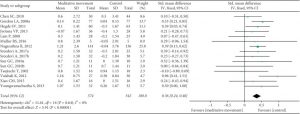Improve Type 2 Diabetes with Mindful Movement
By John M. de Castro, Ph.D.
“Living with diabetes is a major life stressor, from the physical and psychological aspects of managing blood sugar and medications to the eating challenges. A great deal of what we go through in life is beyond our control. The diabetes is always going to be there, but until you connect with what you’re feeling and experiencing, you’re not going to be able to make conscious choices about living with its many challenges.” – Ivy Marcus
Diabetes is a major health issue. It is estimated that 30 million people in the United States have diabetes and the numbers are growing. Type 2 Diabetes results from a resistance of tissues, especially fat tissues, to the ability of insulin to promote the uptake of glucose from the blood. As a result, blood sugar levels rise producing hyperglycemia. Diabetes is the 7th leading cause of death in the United States. In addition, diabetes is heavily associated with other diseases such as cardiovascular disease, heart attacks, stroke, blindness, kidney disease, and circulatory problems leading to amputations. As a result, diabetes doubles the risk of death of any cause compared to individuals of the same age without diabetes.
Type 2 diabetes is largely preventable. One of the reasons for the increasing incidence of Type 2 Diabetes is its association with overweight and obesity which is becoming epidemic in the industrialized world. A leading cause of this is a sedentary life style. Current treatments for Type 2 Diabetes focus on diet, exercise, and weight control. Recently, mindfulness practices have been shown to be helpful in managing diabetes. Mindful movement practices such as Tai Chi and Qigong and yoga are mindfulness practices that are also gentle exercises. There is accumulating research on the effectiveness of these mindful movement practices for the treatment of Type 2 Diabetes. So, it makes sense to examine what has been learned.
In today’s Research News article “Meditative Movements for Patients with Type 2 Diabetes: A Systematic Review and Meta-Analysis.” (See summary below or view the full text of the study at: https://www.ncbi.nlm.nih.gov/pmc/articles/PMC7016481/), Xia and colleagues review, summarize, and perform a meta-analysis of the published research literature on the effectiveness of mindful movement practices for the treatment of Type 2 Diabetes. They found 21 controlled studies; 6 employing Tai Chi practice, 3 Qigong practice, and 12 yoga.
They report that the published research found that mindful movement practices produced significant reductions in fasting blood glucose, glycated hemoglobin (HbA1c), and postprandial blood glucose levels. These results suggest that mindful movement practices improve glycemic control in type 2 diabetes. There were no significant differences found between different mindful movement practices.
They also report that the published research found that mindful movement practices produced significant reductions in total cholesterol and low-density lipoprotein cholesterol and significant increases in high-density lipoprotein cholesterol. These results suggest that mindful movement practices improve blood lipid levels in type 2 diabetes. There were no significant differences found between different mindful movement practices.
The improvements observed produced by Tai Chi, Qigong and yoga practices are very important for the treatment and control of type 2 diabetes. Glycemic control is a key to successful treatment and lipid control is important for reducing cardiovascular problems that can occur. So, these exercises significantly improve the metabolic state of patients with type 2 diabetes. The fact that the different practices were equivalent in effectiveness suggests that the patient can select the practice type that they enjoy most and best suits their lifestyle.
So, improve Type 2 Diabetes with mindful movement.
“Practicing mindfulness exercises and daily physical activity has been shown repeatedly to help manage stress and depression, and promote mental balance and happiness. Mindfulness exercises are therefore a crucial component in both preventing and managing type 2 diabetes, and reducing the risk of complications for type 1 and type 2 diabetics.” – Defeat Diabetes Foundation
CMCS – Center for Mindfulness and Contemplative Studies
This and other Contemplative Studies posts are also available on Google+ https://plus.google.com/106784388191201299496/posts and on Twitter @MindfulResearch
Study Summary
Xia, T., Yang, Y., Li, W., Tang, Z., Huang, Q., Li, Z., & Guo, Y. (2020). Meditative Movements for Patients with Type 2 Diabetes: A Systematic Review and Meta-Analysis. Evidence-based complementary and alternative medicine : eCAM, 2020, 5745013. https://doi.org/10.1155/2020/5745013
Abstract
Objective
Physical activity plays a specific role in the fundamental aspect of diabetes care. It is necessary to develop exercise programs for these patients. The aim of this systematic review is to summarize current evidence regarding the effectiveness of meditative movement in patients with type 2 diabetes.
Methods
The following databases were searched: PubMed, CENTRAL, Web of Science, Ovid LWW, and EMBASE. Two independent investigators searched and screened the studies by finding duplications, excluding irrelevant titles and abstracts, and then selecting eligible studies by reviewing full texts. 21 studies fulfilled the inclusion criteria. Meta-analyses were performed on glycated hemoglobin (HbA1c), fasting blood glucose (FBG) and postprandial blood glucose (PPBG), total cholesterol (TC), triglycerides (TG), high-density lipoprotein cholesterol (HDL-C), low-density lipoprotein cholesterol (LDL-C), and body mass index (BMI).
Results
Meta-analyses showed that meditative movements significantly improved FBG, HbA1c, PPBG, TC, LDL-C, and HDL-C. No improvement was found in BMI.
Conclusions
The results demonstrated a favorable effect or tendency of meditative movements to improve blood glucose and blood lipid levels in patients with type 2 diabetes mellitus. The special effects of meditative movements in type 2 diabetes mellitus patients need further research.
https://www.ncbi.nlm.nih.gov/pmc/articles/PMC7016481/
